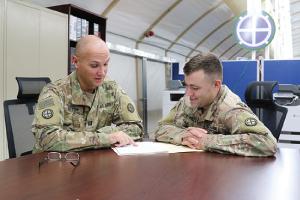By Army Maj. Stacey Krauss, Psy.D., ABPP, and Jillian Ballantyne, Ph.D., BCB
May 28, 2019
 Army photo by Staff Sgt. Tina Villalobos
Army photo by Staff Sgt. Tina Villalobos
A previous Clinician's Corner blog referred to behavioral health technicians (BHTs) as the "unsung heroes of military mental health care teams." There's another area in which these unsung heroes often play a critical role, and that's in their support of internship and post-doctoral psychology training programs.
Among their many significant contributions, BHTs offer psychology trainees opportunities to develop and practice the skills of supervision. The American Psychological Association (APA) – the accrediting body for all psychology training programs – requires trainees to become competent in the provision of supervision. In reality, few trainees receive more than a cursory introduction to supervision during their graduate training years. Most trainees attend a course on supervision and consultation, but do not receive any actual experience of supervising anyone while in graduate school.
The Department of Behavioral Health at Fort Bragg, North Carolina, home to APA-accredited doctoral internship and post-doctoral residency programs, has developed a supervision training experience designed to help our trainees become competent in the delivery of professional supervision. Our success is entirely due to the willingness of our enlisted BHTs to participate in our training programs via a layered supervision model.
Layered supervision means that our BHTs receive weekly, structured supervision with an intern or resident, who in turn is observed and supervised on their supervision by a licensed clinician. This layered model benefits all of the participants involved. The model provides our interns and residents with opportunities to develop and hone their skills as supervisors.
Our BHTs also benefit from receiving supervision that is focused on enhancing their skillsets as technicians, thereby ensuring maintenance of their clinical competence and improved readiness to serve as clinical extenders during deployments. Because all of the supervision is supervised by a licensed psychologist with competence in layered supervision, we're able to ensure that our technicians are treated with respect and courtesy as our trainees get past the initial anxieties about supervision, and blossom into their own competence.
The ultimate winners are our patients, who benefit from receiving care from the best-trained behavioral health providers at every level of the clinical system. Our training model is truly a win-win for everyone.
Maj. (Dr.) Krauss is the director of the Clinical Psychology Internship Program at Womack Army Medical Center (WAMC) at Fort Bragg.
Dr. Ballantyne is the director of training for the three behavioral health graduate medical education programs at WAMC.